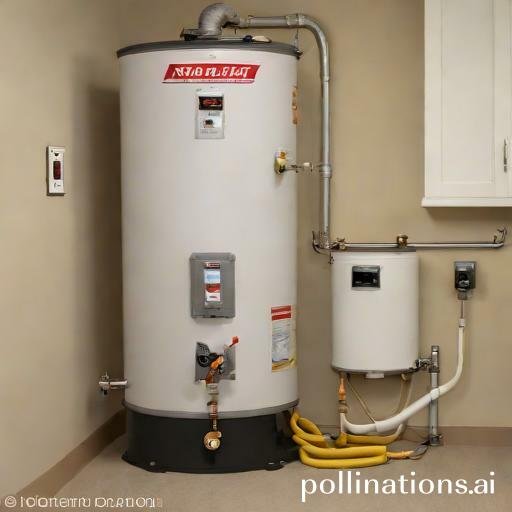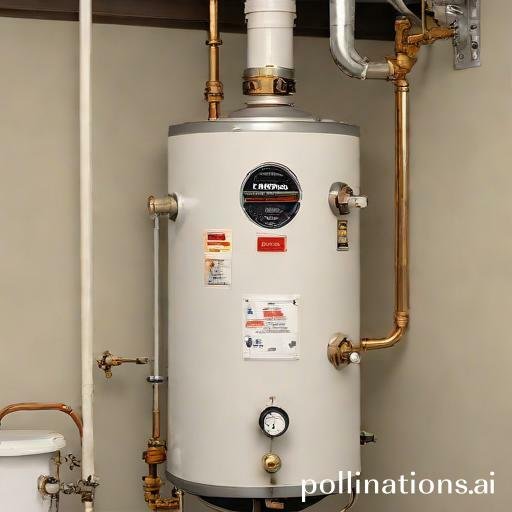
II. Regular maintenance and inspections can help prevent leaks and identify potential hazards.
III. Homeowners should also consider installing safety features such as automatic shut-off valves and drip pans to mitigate the risk of water heater leaks.
Water heater leaks can pose a significant threat to home safety. From damaging property to increasing the risk of electrical shocks and fires, it is crucial to understand the potential dangers associated with water heater leaks.
This article will highlight the importance of regular maintenance and inspection, provide tips for detecting and preventing leaks, and offer guidance on what to do if a leak does occur. By grasping the risks and taking necessary precautions, homeowners can ensure the safety of their homes and protect their loved ones from potential hazards.
Signs of a Water Heater Leak
1. Low hot water pressure
If you notice that your hot water pressure has significantly decreased, it could be a sign of a water heater leak. A leaking water heater can cause a blockage or a break in the pipes, leading to reduced water flow and pressure. This can affect your ability to take hot showers or use hot water for various household tasks.
2. Strange noises coming from the water heater
When your water heater starts making unusual sounds such as banging, popping, or cracking noises, it could indicate a leak. These noises are often caused by the buildup of minerals or sediment in the tank, which can lead to cracks or leaks over time. Pivotal to address these noises promptly to prevent further damage to your water heater.
3. Rusty water coming from the tap
If you notice rusty or discolored water when you turn on the hot water tap, it may be a sign of a water heater leak. The presence of rust or sediment in the water can indicate that the inner lining of the water heater tank is corroded or deteriorating, leading to leaks. Rusty water can also stain your fixtures and laundry, so it is crucial to address this issue as soon as possible.
4. Visible water pooling around the water heater
If you see water pooling around the base of your water heater, it is a clear indication of a leak. This can be caused by a faulty valve, a crack in the tank, or a loose connection. Ignoring this sign can result in significant water damage to your home and potentially lead to mold growth. It is essential to address any visible water pooling around the water heater immediately.
| Signs of a Water Heater Leak |
|---|
| 1. Low hot water pressure |
| 2. Strange noises coming from the water heater |
| 3. Rusty water coming from the tap |
| 4. Visible water pooling around the water heater |
Steps to Take When You Detect a Water Heater Leak
A water heater leak can be a cause for concern, but it’s important to handle the situation promptly and efficiently. By observing these steps, you can address the issue and minimize any potential damage.
1. Turn off the power supply
The first step when you detect a water heater leak is to turn off the power supply. This will help prevent any electrical hazards and ensure your safety. Locate the circuit breaker or switch that controls the water heater and switch it off.
2. Shut off the water supply
Next, you’ll want to shut off the water supply to the water heater. This will stop the flow of water and prevent any further leakage. Locate the main water supply valve and turn it off. If you’re unsure, you can also turn off the water supply to your entire house.
3. Drain the water heater
Once the power and water supply are turned off, it’s important to drain the water heater. This will help reduce the amount of water in the tank and alleviate pressure on the leak. Attach a hose to the drain valve at the bottom of the water heater and direct the other end to a suitable drainage location. Open the valve and allow the water to drain completely.
4. Call a professional plumber
Finally, it’s crucial to call a professional plumber to assess and repair the water heater leak. A trained plumber will have the expertise and equipment to fix the issue safely and efficiently. They can also inspect the water heater for any additional problems and provide recommendations for maintenance or replacement if necessary.
Preventing Water Heater Leaks
Water heater leaks can be a major inconvenience and cause significant damage to your home. By conforming to a few simple steps, you can prevent leaks and ensure the longevity of your water heater.
1. Regular maintenance checks
Regular maintenance checks are essential in preventing water heater leaks. Schedule annual inspections with a professional plumber to ensure that all components are in proper working order. They will inspect the tank, connections, and valves for any signs of wear or damage. Timely detection of potential issues can prevent leaks from occurring.
2. Temperature and pressure relief valve inspection
The temperature and pressure relief valve is a crucial safety feature of your water heater. It releases excess pressure and prevents the tank from exploding. Regularly inspect this valve to ensure it is functioning correctly. If you notice any signs of leakage or if the valve is not releasing pressure properly, it may need to be replaced.
3. Anode rod replacement
The anode rod is a sacrificial component that protects the tank from corrosion. Over time, the rod becomes depleted and needs to be replaced. A corroded anode rod can lead to leaks and other issues. Check the condition of the anode rod regularly and replace it as recommended by the manufacturer.
4. Flushing the tank regularly
Sediment buildup inside the tank can lead to leaks and reduced efficiency. Flushing the tank regularly removes the sediment and prevents it from causing damage. Follow the manufacturer’s instructions on how to flush your specific water heater model. This simple maintenance task can significantly extend the lifespan of your water heater.

Replacing a Water Heater
In this section, we will discuss the process of replacing a water heater and the important factors to consider. Whether your current water heater is old, inefficient, or simply not meeting your needs anymore, it’s important to know when it’s time for a replacement.
1. Knowing when it’s time to replace your water heater
There are a few signs that indicate it may be time to replace your water heater. If you notice that your water isn’t getting as hot as it used to, or if you’re experiencing frequent leaks or rust-colored water, these are clear indications that your water heater is no longer functioning properly. Additionally, if your water heater is more than 10 years old, it’s likely approaching the end of its lifespan and should be replaced.
2. Types of water heaters available
In the realm of choosing a new water heater, there are several options to consider. The most common types include tankless water heaters, which provide hot water on demand and are highly energy-efficient, and traditional tank-style water heaters, which store and continuously heat a large volume of water. It’s important to evaluate your hot water needs and energy usage to determine which type of water heater is best for your home.
3. Professional installation considerations
Replacing a water heater is not a DIY project and should be done by a professional. Hiring a licensed plumber ensures that the installation is done correctly and up to code. They will also be able to properly size the new water heater based on your household’s hot water demands and existing plumbing system.
4. Cost considerations
The cost of replacing a water heater can vary depending on the type of water heater chosen and the complexity of the installation. It’s important to get quotes from multiple plumbing companies to ensure you’re getting a fair price. Additionally, consider the long-term energy savings of a more efficient water heater, as this can offset the initial cost.
| Type of Water Heater | Pros | Cons |
|---|---|---|
| Tankless | – Energy efficient – On-demand hot water |
– Higher upfront cost – Limited hot water capacity |
| Traditional tank-style | – Lower upfront cost – Large hot water capacity |
– Less energy efficient – Constantly heating water |

Insurance Coverage for Water Heater Leaks
1. Homeowner’s insurance coverage
Relating to protecting your home and its appliances, homeowner’s insurance is an essential investment. It provides coverage for various risks, including water heater leaks. In the event of a leak, homeowner’s insurance can help cover the costs of repairs or replacements.
2. Flood insurance coverage
In the course of homeowner’s insurance typically covers water heater leaks, it may not provide coverage for damages caused by flooding. This is where flood insurance comes into play. If your water heater leak is a result of a flood, having flood insurance can help protect you from extensive financial losses.
3. Water damage coverage
In addition to homeowner’s insurance and flood insurance, it’s important to check if your policy includes specific water damage coverage. This coverage can provide financial assistance for damages caused by water leaks, including those from your water heater. It’s crucial to review your insurance policy and understand the extent of your water damage coverage.
To further understand the implications of insurance coverage for water heater leaks, let’s take a closer look at the table below:
| Insurance Type | Coverage for Water Heater Leaks |
|---|---|
| Homeowner’s Insurance | Typically covered, but policy-dependent |
| Flood Insurance | May not be covered, check policy |
| Water Damage Coverage | Policy-dependent, review coverage details |
Bottom Line
Water heater leaks can cause significant damage to your home and pose a safety risk to you and your family. Regular maintenance and inspections can help prevent leaks and ensure your water heater is functioning properly. If you do notice a leak, it’s important to address it immediately to prevent further damage. Consider installing a water alarm to alert you of any leaks and have a plan in place in case of an emergency. Additionally, be sure to follow proper safety precautions when working with your water heater, such as turning off the power and gas supply before making any repairs. By taking these steps, you can help keep your home safe and avoid costly repairs.
In summary, water heater leaks are a serious issue that should not be ignored. Regular maintenance, quick action when a leak is detected, and proper safety precautions can help prevent damage to your home and keep you and your family safe.
Read More:
1. Diy Leak Repairs Using Natural Remedies
2. Leaks And Their Effect On Water Heater Aesthetics In Modern Homes
















